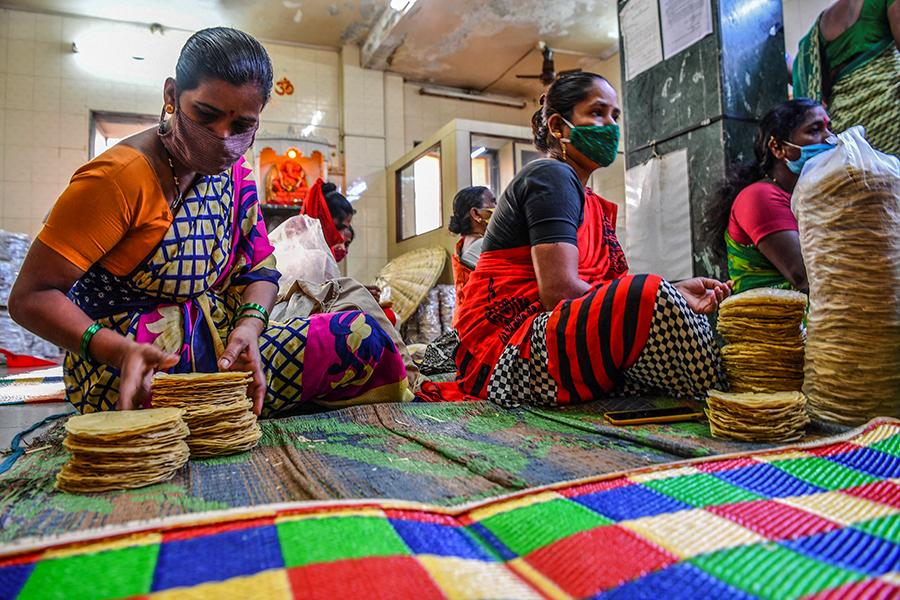Information asymmetry is keeping rural women entrepreneurs from success
Most semi-urban and rural Indian women who want to run their own micro-companies are either unaware of welfare schemes they can avail for financial support or they are too hesitant to apply
Farida, a 36-year-old widow lives in a small village in Kutch, Gujarat, with two daughters. She feeds her family by growing vegetables in her kitchen garden and supports them financially by working as household help in nearby homes. To supplement her income, she opened a small retail shop to sell groceries. However, with growing competition in her community, Farida’s customer base began to dwindle, making it increasingly hard for her to sustain her enterprise, eventually forcing her to shut shop.
Without capital to procure products for sale resulting in unstable cash flows, Farida could not continue her business, even though she had the requisites to apply for financial aid, i.e. an Aadhaar card and PAN card, as well as RSBY (Rashtriya Swasthya Bima Yojana) health insurance and a savings account. She did not wish to opt for a government entitlement—tailored to the needs of women like her—because she felt unsure of her ability to repay the loan and was unaware of the modalities for the same.
Unfortunately, Farida’s situation is not unique in this respect. Several micro and small ventures led by women face cash flow issues during their growth trajectory and are unable to tide over the same without assistance. For this purpose, the government, along with grassroots-level organisations have established regulatory, promotional, credit and representational institutions to train, protect, represent and provide financial resources to women entrepreneurs and their businesses, such as providing direct income transfers, social protection, benefits for employment in the informal sector, gender-responsive social income security, expanded unemployment benefits, tax breaks, and childcare benefits.
In Farida’s case, state-level schemes like The Udyami Mitra scheme, Start-Up Gujarat, or the Ghardivda Bankable Finance Scheme for women below the poverty line, would have enabled her to become a part of the larger women entrepreneurship ecosystem in the state; gain insight into the different schemes which could benefit her micro-venture, and consequently, avail of low-interest loans (which could be paid off in realistic installments). However, due to information asymmetry, low access to details about government entitlements, and women-centric loans and policies, Farida was unable to sustain her livelihood.
Recognising that women play a crucial and pivotal role in the development of India’s micro, small and medium enterprises (MSME) sector, several schemes and grants specifically for women entrepreneurs have also been introduced by the government, for instance, the National Mission for Empowerment of Women, the Prime Minister‘s Rojgar Yojana (PMRY), Entrepreneurial Development Programmes (EDPs), Management Development Programmes and Women‘s Development Corporations (WDCs).
However, the gap lies in the lack of awareness regarding the very existence of the scheme or programme, how it can be accessed, and prove to be beneficial. Today, there is a pressing need to inform women entrepreneurs from semi-urban and rural areas, about the various government-led initiatives that can provide their businesses with timely financial support.
According to a study led by LEAD, Krea University (with a sample size of 2,083 women across Bihar, Chhattisgarh, Madhya Pradesh, and Odisha), only 54 percent of the women knew about the Covid-19 relief measures introduced by the government, as opposed to 76 percent of the men. This is further corroborated by the ‘Landscape Study on Women Entrepreneurship’ by the EdelGive Foundation, where only one percent of women have availed of any government schemes. This is primarily because only 11 percent are aware of any schemes, of which 21 percent have applied for the same, and less than a third i.e. 29 percent have managed to avail of any benefit from the schemes.
It was also found that those women entrepreneurs who had the requisite knowledge, were hesitant to access the financial aid made available through government-led plans, programmes and schemes, like Farida. The reasons for this are multifaceted — many feel they will not be able to repay the bank, or they believe they will not be given a loan, because they do not have any collateral in the form of tangible assets owned by them, or in their name. Furthermore, many do not have the required identification documents and feel the process of obtaining them is too cumbersome.
This clearly highlights the urgent need for women to be part of entrepreneurship networks, through which they will be able to seek and gain access to information that enables them to sustain or grow their businesses. Moreover, coordinated efforts by stakeholders across the system — especially grassroots organisations — to ensure adequate information dissemination and scheme linkage, will ensure that strategic interventions reduce the gap in awareness at the semi-rural and rural level.
Additionally, introducing women to the vast contours of the ecosystem will provide them with examples of women who have received tangible benefits from schemes provided at the national, state, and hyperlocal levels. Lastly, community mobilisation by local self-help groups and not for profits is essential in providing relevant and timely information, which can support women entrepreneurs in the documentation process involved in availing of different schemes. With this the information gap, asymmetry, and disproportionate impact are sure to visibly decrease, heralding a fresh paradigm for an equitable, resilient and empowered India.
The writer is an Executive Chairperson at EdelGive Foundation
The thoughts and opinions shared here are of the author.
Check out our end of season subscription discounts with a Moneycontrol pro subscription absolutely free. Use code EOSO2021. Click here for details.
